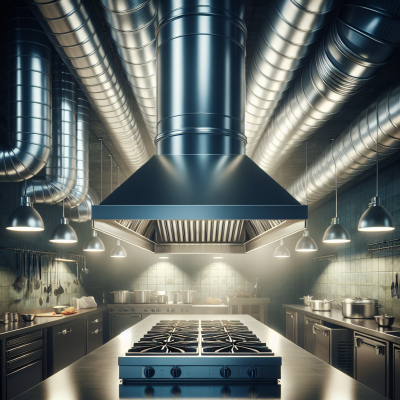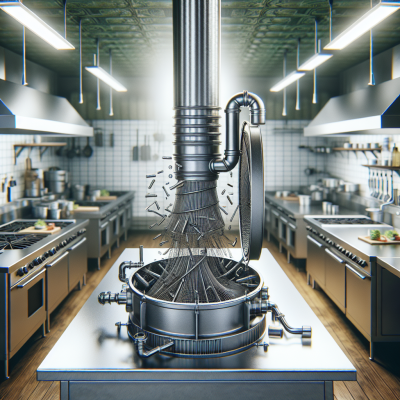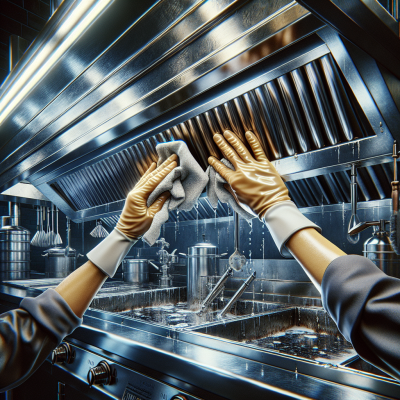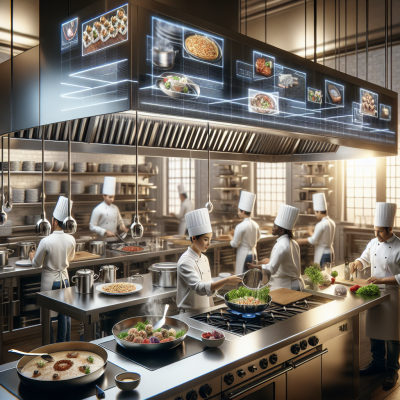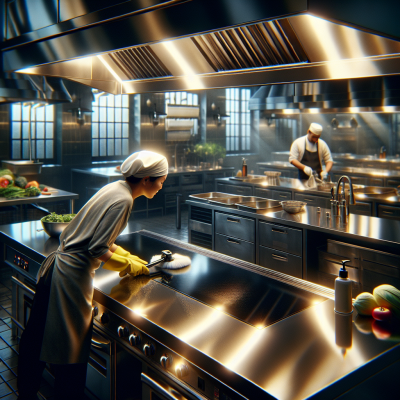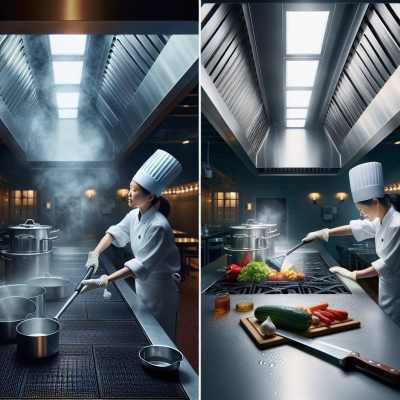Ensuring Allergen-Safe Kitchens Through Effective Hood Cleaning
Running a restaurant in Charlotte means being keenly aware of the growing demand for allergen-conscious dining experiences. Today’s diners aren’t just searching for delicious menus—they’re also prioritizing safety, specifically the prevention of allergen cross-contamination. This necessity elevates the task of hood cleaning from a mere chore to an essential operation for every restaurant aiming to maintain a safe and welcoming kitchen environment. Delving into the world of restaurant hood cleaning is crucial not just for compliance with health regulations, but also for providing a safe dining experience for all your customers.
Understanding the Role of Kitchen Hoods
Before we dive into the specifics of commercial kitchen hood cleaning, it’s important to understand the crucial role that kitchen hoods play in a restaurant. These hoods are designed to capture and eliminate airborne grease, smoke, heat, and other food-related vapors that are part and parcel of a bustling kitchen environment. An effectively cleaned kitchen hood ensures better air quality, reducing potential health hazards for both staff and customers.
Moreover, the hood’s filtration systems are responsible for capturing particles that can harbor allergens. Over time, if not maintained properly, these particles can be released back into the air, increasing the risk of cross-contamination. Given how widespread food allergies are today, regular exhaust hood cleaning is a non-negotiable action item on any restaurant owner’s checklist.
The Dangers of Allergen Cross-Contamination
Cross-contamination occurs when allergens from one food item inadvertently come into contact with another, potentially triggering severe allergic reactions in susceptible individuals. In a bustling kitchen, where orders fly in and chefs work at rapid speeds, the chances of this occurring are heightened, which is why preventive measures are crucial.
Research indicates that even minor allergen traces can cause significant health issues for someone with a food allergy. That’s why restaurants are investing more into their kitchen hygiene practices, with hood cleaning forming a major component of those efforts. By frequently cleaning the exhaust systems, restaurants can better control the airborne spread of allergenic particles, significantly lowering the risks of cross-contamination.
Steps in Effective Hood Cleaning
To ensure that your kitchen remains a safe haven against allergens, consider implementing an effective hood cleaning routine. Here’s a simple guide:
- Routine Inspection: Regular inspections ensure that hoods, flues, and filters are functioning optimally. Clogged systems can harbor grease and allergens, increasing risks of contamination and fire hazards.
- Frequent Cleaning: Establish a cleaning schedule that considers the frequency and volume of cooking taking place. High-volume kitchens may require more frequent commercial kitchen hood cleaning to keep systems in check.
- Professional Services: Consider hiring professionals for restaurant hood cleaning. They have the expertise to dismantle, clean, and reassemble hoods efficiently, ensuring no part is left untreated. They are also adept at spotting potential issues before they become significant problems.
- Staff Training: Ensure that all staff are aware of your allergen-management plans and trained in recognizing allergen-related concerns. Knowledgeable staff make fewer mistakes that could lead to cross-contamination.
Utilizing these steps not only keeps allergens at bay but also enhances the overall efficiency of your kitchen operations, providing a safer environment for both your employees and guests.
Beyond Cleaning: Additional Allergen-Prevention Practices
While routine hood cleaning is a significant step toward maintaining an allergen-safe kitchen, it must be part of a broader allergen-control strategy. Here are additional practices to bolster your efforts:
- Separate Storage: Store allergenic foods separately from non-allergenic ones to reduce the risk of cross-contamination.
- Dedicated Equipment: Use separate cooking tools and equipment for preparing allergen-free dishes.
- Clear Labeling: Ensure all food storage and preparation areas are clearly labeled, particularly when allergenic ingredients are involved.
- Robust Cleaning Protocols: Consistent cleaning practices across all kitchen surfaces and equipment reduce the spread of allergens.
By incorporating these practices, restaurants can further minimize the risk of allergen exposure and provide safer dining experiences for all patrons.
The Benefits of Partnering with Professionals
Many restaurant owners in Charlotte have found that outsourcing their restaurant hood cleaning tasks to expert services yields significant benefits. Professional hood cleaning services deliver thorough and efficient cleanings, utilizing specialized equipment and informed techniques to ensure every corner of the hood system is spotless and free from lingering allergens.
Instance after instance, it’s clear how professional cleaning not only meets but often exceeds regulatory compliance standards. This proactive step provides peace of mind, knowing that you’re protecting your customers and minimizing risks associated with allergenic cross-contamination.
For those looking to enhance the safety and reputation of their commercial kitchens, reaching out to a trusted hood cleaning service can be the key to achieving an allergen-safe kitchen in Charlotte. Prioritizing such efforts ensures that your restaurant remains a staple of culinary excellence and allergen safety.



